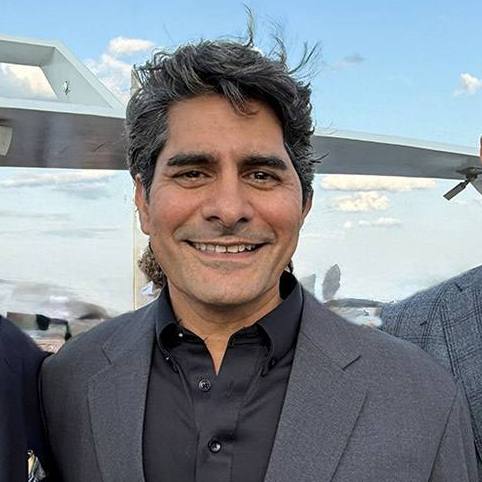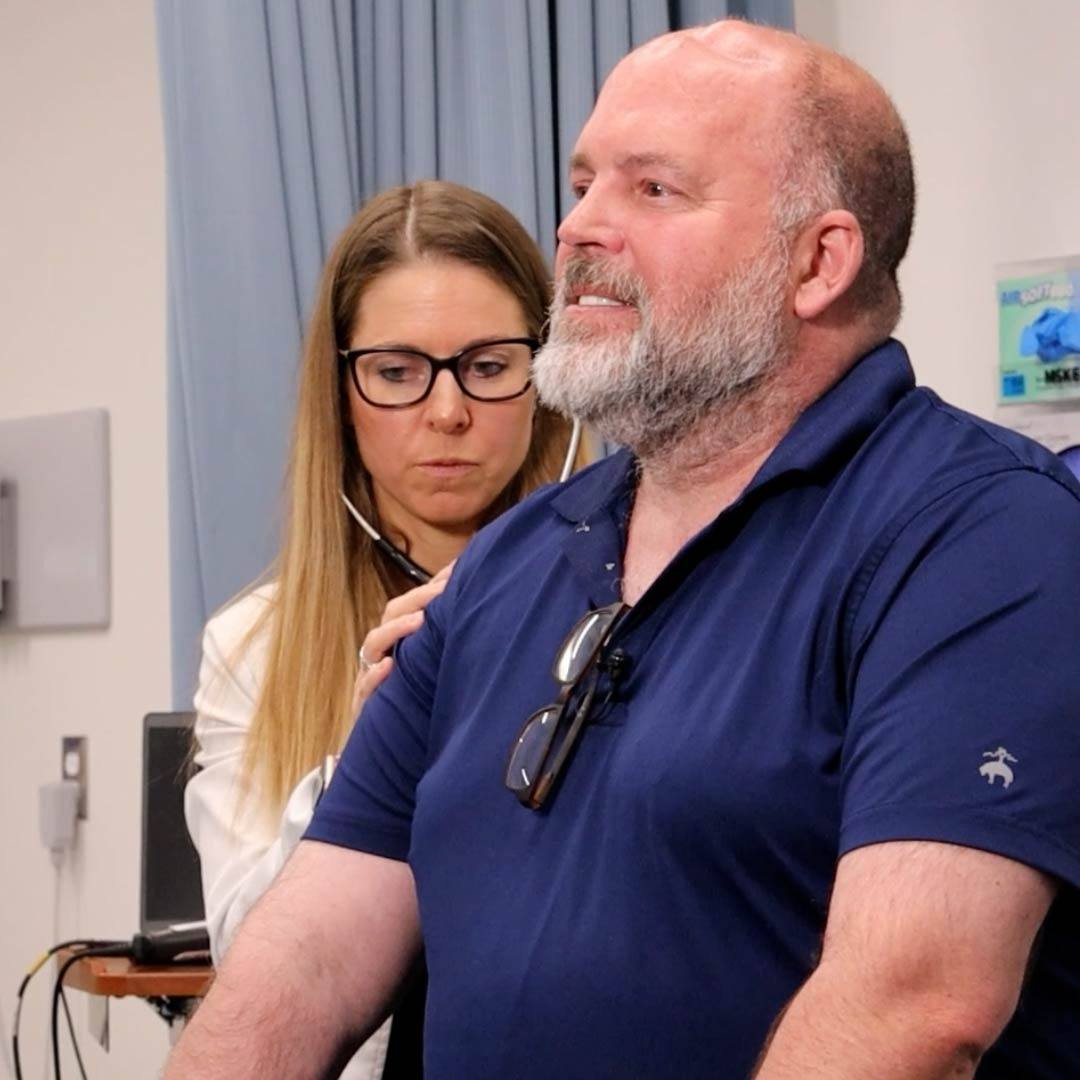
When Jo-Ann Rosemont learned she had a meningioma in her head, she followed her care team's advice and had regular checkups for more than a year to make sure it wasn't growing. But after one of her local doctors insisted that she get a second opinion at Mayo Clinic, Jo-Ann ended up undergoing a unique surgery that saved her eyesight.
Jo-Ann Rosemont knew she had a brain tumor, but she didn't think there was much to be done about it. "It wasn't really growing, and all the doctors said, 'This is a wait-and-see situation,'" Jo-Ann says.
When an MRI found the meningioma that was sitting on her optic nerve, the neurologists and neurosurgeons Jo-Ann was seeing near her home in Melbourne, Florida, recommended regular monitoring, but treatment for the noncancerous tumor wasn't necessary.
"Meningiomas are present in about 5% of the population," says Kaisorn Chaichana, M.D., a neurosurgeon at Mayo Clinic in Florida. "Most of them are found incidentally, as happened with Mrs. Rosemont, and most are benign."
A more pressing concern for the elementary school counselor was the debilitating headaches she had been enduring for three years. "I was waking up with severe migraines, and it was hard to get ready in the morning and drive to work," Jo-Ann says. "It got to the point where I had to spend the whole weekend in bed."
None of the medications she was taking provided any relief. After talking about the migraines with her primary care doctor in Satellite Beach, Florida, during summer 2018, the physician suggested Jo-Ann get a second MRI, along with a sleep study.
That recommendation not only paved the way for Jo-Ann to be freed from her migraines, it also led to resolution of the meningioma, which turned out to be a much more significant threat to her health than Jo-Ann or her local care providers had realized.
Unified care
In October 2018, when Jo-Ann was at her sleep study appointment, she received the results of the second MRI, and they were cause for concern. "This doctor strongly suggested I seek a second opinion and told me going to the Mayo Clinic was my best option," Jo-Ann says. "He was very firm about my staying home the next day and getting an appointment as soon as possible."
"I got to experience how thorough the communication is at Mayo. You go to one area, and they schedule everything. That alleviates so much stress."
Jo-Ann Rosemont
Jo-Ann called Mayo Clinic and received an appointment in the Department of Neurology. At that appointment, she met with neurologist David Capobianco, M.D., who specializes in migraines, and neurologist Julie Hammack, M.D., an expert in brain tumors. Dr. Hammack felt it was important for Jo-Ann to see an ophthalmologist to determine if the meningioma was affecting her eyesight. Dr. Hammack referred Jo-Ann to Mayo Clinic ophthalmologist Eric Eggenberger, D.O.
"I got to experience how thorough the communication is at Mayo. You go to one area, and they schedule everything. That alleviates so much stress," Jo-Ann says. "I just felt a big sense of relief because everything was seamless. Every person I communicated with was thorough, caring and patient."
Prompt treatment
At the appointment with Dr. Eggenberger, Jo-Ann learned that her meningioma had gone beyond the wait-and-see tactic. "He told me I had a right eye field defect, and that the optic nerve was thinning because of the tumor," Jo-Ann says.
Treatment options included the possibility of surgery to remove the tumor or radiation to shrink it. Dr. Eggenberger recommended consults with a radiation oncologist and a neurosurgeon.
Surgery turned out to be the best choice. When Jo-Ann had her Neurosurgery appointment with Dr. Chaichana in February, he emphasized the importance of moving forward quickly to preserve her eyesight. "Once the vision starts to be comprised, you want to do surgery right away," he says.
"Dr. Chaichana is very intelligent," Jo-Ann says. "He has a very calming presence and seemed to get my sense of humor. It helped to have a little levity, even during one of the most serious times of my life."
"I felt very confident that (Dr. Chaichana) would be the perfect surgeon to do this."
Jo-Ann Rosemont
The surgeon explained to Jo-Ann that the technique he would use to remove the tumor — a procedure called an orbitozygomatic craniotomy — would be less invasive than a traditional approach. "Instead of using a retractor that looks like a spatula to pull the brain up to get to the tumor, we would take the bones around her eye out, so we could sneak around the brain and not touch it," Dr. Chaichana says.
That sounded good to Jo-Ann. "He told me he could do this surgery without having to manipulate the brain," she says. "I felt very confident that he would be the perfect surgeon to do this."
Jo-Ann underwent the surgery on Feb. 19, and the results were exactly what she and Dr. Chaichana had hoped for. "When he got the tumor, the optic nerve popped right back into the canal. It was healthy," Jo-Ann says. "Had I not gone to Mayo, I would have lost my eyesight."
Excellent outcome
Jo-Ann went home three days after the surgery. Within a few days, the peripheral vision she had lost was restored. Although it's not clear if it was related to the surgery, her migraines also stopped. "While there is no medical explanation for this, tumors can trigger pre-existing migraines," Dr. Hammack says. "Migraine is a highly variable disorder which sometimes can remit spontaneously, however."
With the removal of the meningioma and the disappearance of the migraines, Jo-Ann is thrilled with how everything was resolved. "I'm grateful to my surgeon who is a skilled and kind person. I'm grateful for the positive outcome," Jo-Ann says. "Now that the tumor is gone, I have nothing hanging over me. Everything at Mayo was so seamless. I can't say enough good things."
Dr. Chaichana credits Mayo Clinic's emphasis on collaboration with serving Jo-Ann well. "Because we work as a multidisciplinary team," he says, "Mrs. Rosemont was able to see many specialists who diagnosed her and quickly referred her to me for what was a very time-sensitive surgery."
Watch this video for more about innovative approaches to brain surgery:
HELPFUL LINKS
- Learn more about meningiomas.
- Read about Neurosurgery and Neurology at Mayo Clinic.
- Connect with others talking about brain tumors on Mayo Clinic Connect.
- Explore Mayo Clinic in Florida.
- Request an appointment.







